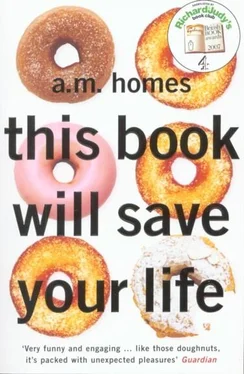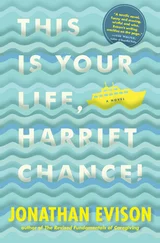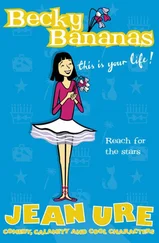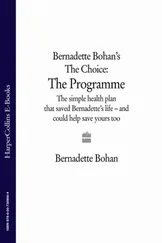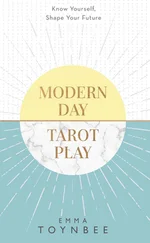Nic shakes his head — "I'll pass."
"OK if I borrow the car?"
"Please, take the car."
"I'LL GO WITH YOU, if you want company," Ben says.
"Can you drop me at the pier?" Barth asks.
Richard is glad for the time alone with Ben. He doesn't explain about the car, doesn't tell them it belonged to John Lennon — he doesn't want Ben to think he's showing off, and for some strange reason he just doesn't want Barth to know. He also doesn't call Cecelia ahead — she'll talk him out of it. He figures he'll call from along the way — pie in hand — and she won't be able to refuse him.
They take the 10 into town, get off at Fairfax, and stop at the Farmers Market. "She likes pie," Richard tells Ben, getting a raspberry-peach and giving Ben a tour of the market — which used to be a place where real farmers brought their produce and goodies into town and sold them, and now it's kind of a tourist attraction.
Ben nods. He buys postcards. From a parking lot off Vermont, Richard calls Cecelia; she tells him there's no need to come.
"But I want to," he says. "I'm already down here on Vermont, and I brought you a pie from DuPar's."
They're greeted by Cecelia's husband, Walter. "It's my day off."
"We brought pie," Richard says, holding out the box.
"Come in."
"This is Ben."
"The boy from New York?"
Ben nods.
"What's that like? Dirty? Noisy?"
"It's nice," Ben says. "There's always something going on."
Walter shakes his head. "Can't imagine it. At the post office we get a lot of people from the East wanting to transfer out here — even on a rough route, the sun always shines in Los Angeles. It's all about quality of life. I've got relatives in Newark, never see them, I don't like the cold."
"Would you like some tea?" Cecelia pushes her walker into the room.
She looks like an old woman. The top of her hair is suddenly gray; was it gray three weeks ago, did the rinse wash off, did she go gray overnight? Richard hugs her, holding tight. "How are you feeling?" Over Cecelia's shoulder he sees her noise-canceling headset on the kitchen counter.
"Let's just say they don't exactly tell you the truth about how it's gonna be. I guess if they said it's like getting run over by a Mack truck most people wouldn't let them do it."
"You'll feel better soon."
"What choice do I have? It's not like you can take it back and ask for a refund."
There's a pause.
"So this is home," Richard says.
"This is the house you paid for," Cecelia says.
"You worked hard for it."
"I did not," Cecelia says. "I hadn't worked for you six months and you gave me twenty thousand dollars for my down payment."
"I did?"
"And you didn't let me pay you back."
"Frankly," Walter says, "I don't like the feeling of being indebted."
Richard shrugs. "I have no memory of it."
"You think I've been nice to you all these years for nothing," Cecelia teases him.
"Her hip would have lasted a lot longer if she wasn't cleaning houses," Walter says. Cecelia shushes him. "I guess it's a good thing they can put a new hip in," he continues, "they didn't use to be able to do that. Back when I was in Korea, lots of boys lost parts and they couldn't do much for them. Do you know, we black soldiers from World War II and Korea still haven't gotten our medals. I just wonder if nice white folks know that."
"I didn't know that," Richard says.
"Didn't think so," Walter says.
"It's his bone," Cecelia says. "He chews that bone every day."
"Well, let's put it this way," Walter says. "I was proud to serve my country, even if my country isn't proud…. Hopefully, they'll come before I die. It was the integrated army— that was a big deal. Executive Order 9981, signed by President Harry Truman, July 1948. My whole life I've been a government worker. The military and the Postal Service."
"Want pie?" Cecelia asks Walter.
"Sliver," Walter says. "Watching my sugar."
"Is there anything you need?" Richard asks Cecelia.
"I've got it all," Cecelia says. "I'm going to physical therapy and hope to give them back this walker next week."
"If you think of anything, let me know. I have this cell phone now, so you can call me anytime." He writes the number down.
"How's the house?"
"They're working on it."
"And you," she says to Ben, "got a summer job?"
He nods. "Starts tomorrow."
"You let me know how it goes."
"I will. We'll see you soon," Ben says as they're leaving.
"I'm counting on it," Cecelia says.
In the car on the way home, Richard thanks Ben for going with him. "It was good we did that. She's worked for me for more than a decade, you can't just let that go."
"Why do you hate Barth?" Ben asks.
"I don't hate him."
"Yes, you do."
"I don't know."
"The good thing is, he doesn't notice."
Richard nods. That's part of why he hates him.
Instead of taking the highway home, Richard goes the scenic route. He takes Ben to Chinatown for lunch. He takes him to a place that a woman took him to on a date about five years ago — Hop Louie's. The restaurant is deserted except for a large group of Chinese people gathered around an enormous table.
"Are you open?"
"Open and ready to serve."
They order a bountiful spread — hot-and-sour soup, sweet-and-sour pork, steamed dumplings, fried rice — and immediately Richard feels guilty: they've ordered too much, Ben will overeat and have to go back to the husky department.
"Are you still playing the piano?" Richard asks.
Ben nods. "One night, I got to duet with Harry Connick. Mom and I were at some party and I asked him if he'd play with me."
The food arrives.
"What did you do for your birthday this year?"
"Mom took me and a bunch of people from her office to a super-fancy new restaurant — the kind of place that's twenty dollars a bite — I calculated it."
They eat until they are stuffed, and they crack their fortune cookies: "Happiness is before you." "A good friend sometimes says nothing at all."
The long way home: Richard takes Ben to the tar pits, tells him about the La Brea woman, the saber-toothed cat who may or may not be extinct. They both breathe deeply and talk about whether or not a person can get high on the smell of the asphalt.
"It's a strange city," Richard says. "Filled with things that are not obvious. Did you know that tar can pop up anywhere within a five-mile radius? And up in Beverly Hills, there are people with oil wells in their backyards?"
"Are we near Disneyland?"
"Disneyland?"
"Yeah, I always wanted to go to Disneyland."
"You really want to go to Disney?"
"Yes."
"Fine, we'll go."
"Good."
There is a pause as though something has happened.
"When you left, was someone having an affair?"
"No."
"That at least would have made sense."
And then a change of subject.
"Did your uncle really think he was going to win a Nobel Prize?"
"Apparently."
"Must be rough."
"According to Barth, everything he ever did was all about getting to that moment, and now he thinks it's all shit, he walks around muttering, 'Not good enough, someone won, someone always wins.' "
"When he was younger he used to have temper tantrums," Richard says. "My parents would sit in the living room and ask each other what they should do: Should we call the police? On our own child? His outbursts were impressive — he would bang on the walls, smash things. 'Jews don't call the police,' my father would say. 'The police are Irish and they're not interested in our problems.' "
"Weird."
Richard nods.
On the way home they stop at Anhil's — Richard introduces Ben. The boy orders a jelly donut.
"You don't need a donut," Richard says. "We just had lunch."
Читать дальше
